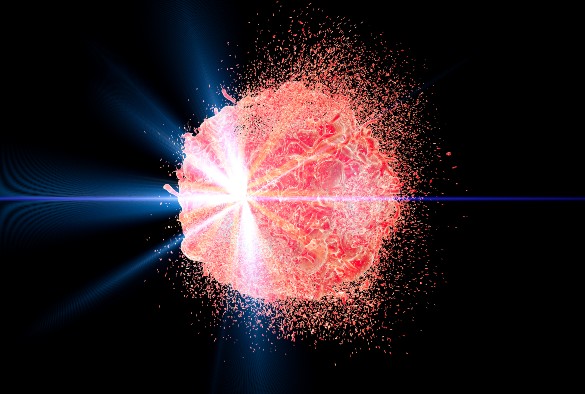
A University of Liverpool academic has been awarded a prestigious NIHR Doctoral Research Fellowship aiming to reduce harmful side effects of radiotherapy for lung cancer patients.
Starting in October 2021, Mark Warren’s project will test how accurately and precisely Magnetic Resonance Imaging can describe tumour position and motion. Mark aims to determine whether these images can be used to reduce the margin of healthy tissue targeted with high radiation doses, and calculate resulting reductions in radiation doses to the heart and other critical organs.
The findings will guide the design of more accurate radiotherapy treatments, aiming to reduce side-effects and potentially to improve cure rates.
Mark Warren said: “Lung cancer is the third most common cancer in the UK but the most common cause of cancer death. Radiotherapy is the standard curative treatment for inoperable lung cancer. It works by carefully targeting the cancer with beams of high dose radiation. Although it is an effective cure, there are opportunities to reduce its harmful side effects and increase survival. One way would be to improve the precision and accuracy of targeting.
“The best information about tumour position is presently provided by four-dimensional computed tomography (4D-CT), a type of X-ray image. 4D-CT images do not show the full extent of tumour motion during breathing, nor provide good contrast between tumours and healthy tissues.
“Immediately before daily radiation treatments, we adjust the targeting of tumours using images collected by CT scanners built into the machines that deliver radiotherapy. But these images are poor quality, and while some tissues like bone are seen clearly, centrally-located tumours are not.
“To avoid missing the tumour, the region targeted with high radiation doses will include a margin of surrounding non-cancerous tissues. For lung tumours situated close to critical organs, this can cause harmful side-effects, including heart disease and premature death.
“A new treatment machine called an MRI-linac can take four-dimensional magnetic resonance images (4D-MRI). These images provide sharper contrast than 4D-CT, and can be taken more often and over longer periods. This may allow us to see better where tumours are, and to take steps immediately before treatment to avoid delivering radiation to healthy tissues.”
4D-MR and 4D-CT images from 20 lung cancer patients undergoing radiotherapy at Clatterbridge Cancer Centre will be collected and analysed.
The newly established Liverpool Cancer Research Institute (LCRI), which functions as a translational research engine in which clinical themes provide a bi-directional conduit linking fundamental science, experimental medicine and clinical research. The LCRI encompasses all cancer research activity with the University of Liverpool and all translational research in Clatterbridge Cancer Centre. Find out more: https://www.liverpool.ac.uk/liverpool-cancer-research-institute/about/
Professor Nagesh Kalakonda, Clinical Director (Research and Innovation) at the Clatterbridge Cancer Centre NHS Foundation Trust, said: “We are delighted to learn that Mark has secured a prestigious NIHR Doctoral Fellowship that is focused on MRI guided radiotherapy treatments for cancer patients.
“The preliminary work that was instrumental in securing this award was funded in a £25K grant by the Clatterbridge Research Fund, sponsored by the Clattterbridge Cancer Charity. This attests to the importance of this ongoing programme for pump-priming promising projects. We wish Mark every success in his planned work.”
Katrina Bury, Head of Charity at the Clatterbridge Cancer Charity, said: “I am delighted that funding from The Clatterbridge Cancer Charity has enabled Mark to initiate this incredible work and that further funding has now been secured to extend his research, which will have a significant impact on the care of patients. I would like to thank our supporters whose donations to our Charity have allowed this life-changing research, which will shape cancer care for generations to come, to take place.”
Mark Warren is a lecturer in the University’s School of Health Sciences and a HCPC registered therapeutic radiographer. Mark will be supervised by Dr John Fenwick within the Faculty of Health and Life Sciences, and the radiotherapy research team at Clatterbridge Cancer Centre will also be contributing to his supervision and training.
The School of Health Sciences provides education and training to people at all stages of their careers in diagnostic radiography, nursing, occupational therapy, orthoptics, physiotherapy, and therapeutic radiography. The School is increasing its clinical academic networks, and is actively supporting clinicians/lecturers within the school to progress through clinical academic career pathway.